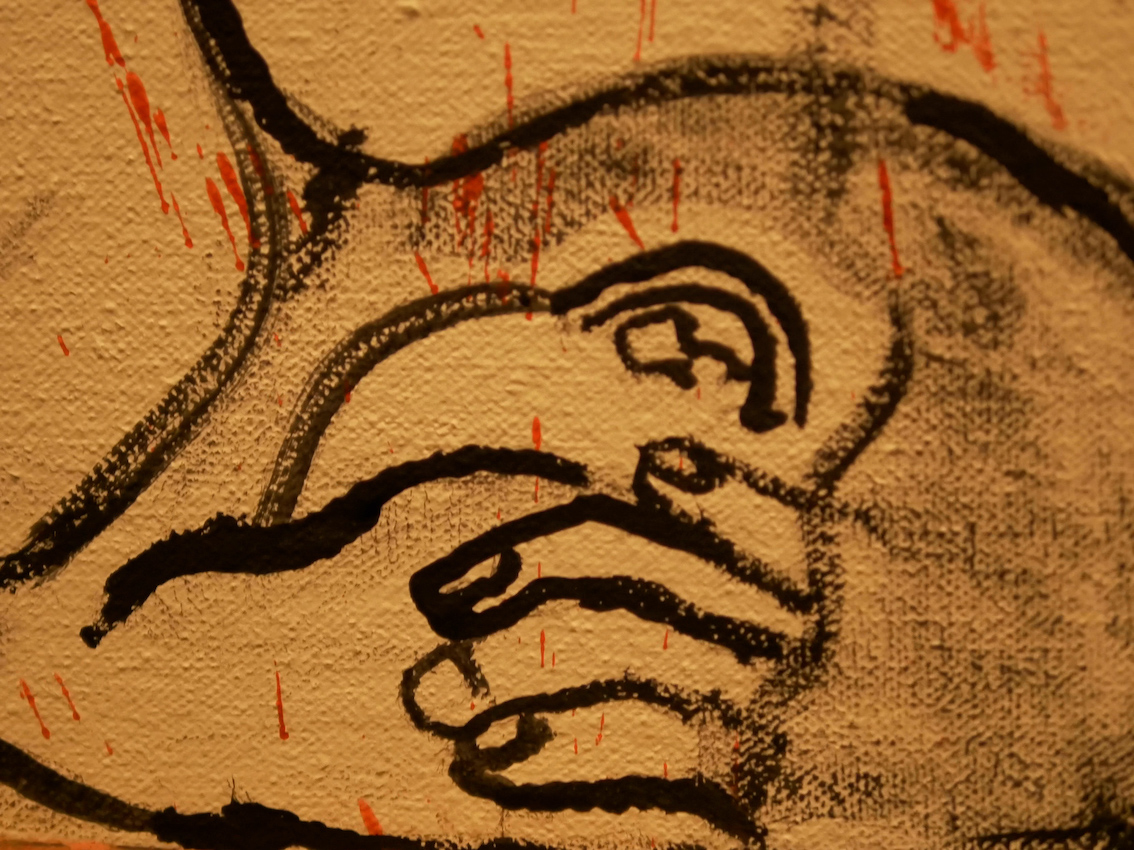“We don’t have the same stories, but we share a history. Children born of Africa. People of power, remember, remember, remember.”
Song from the Tanger CommemorAction, 24 June 2023
As Alarm Phone, we are witness to the murder perpetrated on a daily basis by the European authorities in collaboration with their African counterparts. Every morning, every afternoon, every evening and every night, we are on the phone with people is deep distress in the Mediterranean sea and on the Atlantic ocean. We are witness to all these silenced and invisibilised deaths, to boats of which there will never be any more news, and of bodies washed away by the waves.
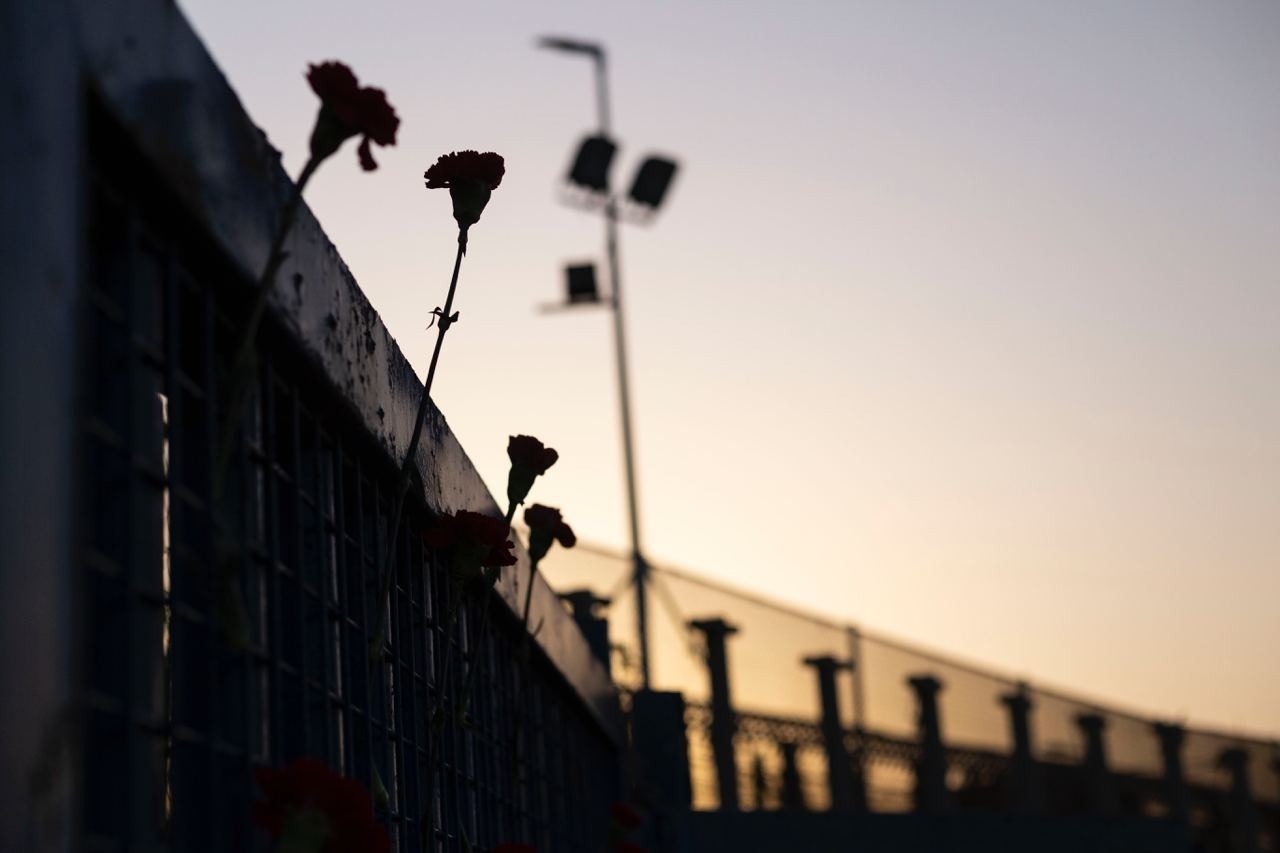
Source: Mathias Rodríguez
We are stunned, angered and we feel impotent in the face of this daily violence inflicted by the state. 24 June marks the first anniversary of the biggest massacre perpetrated at a European land border. At the Barrio Chino border, in the city of Melilla, the Moroccan police and the Spanish Guardia Civil killed at least 37 people and are responsible for the disappearance of 77 other people [AP reported]. This massacre once again shows brutally that none of these deaths happen by chance. They are not accidents. They are the result, at the very, very least, of negligence, but the more serious charge is that they are a choice: one in which certain human lives can be sacrificed in order to implement racist and xenophobic policies at any cost. The murder of people abandoned at sea and the massacres of unparalleled violence carried out at the land borders are part and parcel of this same logic.
“We may not be given explanations, but justice will always be demanded. This is the result of a sick policy on the part of the European Union, a policy which boils down to trying to prevent people from moving even though it is an absolute right to move when and how you want. There are still massacres at the borders, the victims are not consoled and they are automatically forgotten.” — I., a member of Alarm Phone Tanger
Today, like every other day, our thoughts and hearts are with the survivors of this terrible massacre, with the dead, with their families and with their friends. The never ending suffering of loved ones, who do not know if their sons and daughters or their friends are alive or not, is never acknowledged. We wish to express our full support for them in their search for their missing friends and family.
As Alarm Phone, we salute and support those who take action every day to assert their and others’ right to freedom of movement. L., a survivor of the Melilla massacre, recalls:
“It was really horrible the day when R. and I decided to follow the crowd to go take on the fences of Melilla. The Force Auxiliaires beat me until I saw Death knocking on my door. My only friend, R., did not survive and he gave up the ghost before my very eyes. R., may your soul rest in peace, a soldier never dies. Migration policy at Europe’s border is very, very badly managed, it is a politics which kills, perhaps on a low flame (sickness, starvation, mental depression, stress…), perhaps brutally (being beaten by the police or by the population…). This politics can change if, and only if, the European Union and Moroccan authorities decide to put an end to it by respecting and applying human rights law to the letter.”
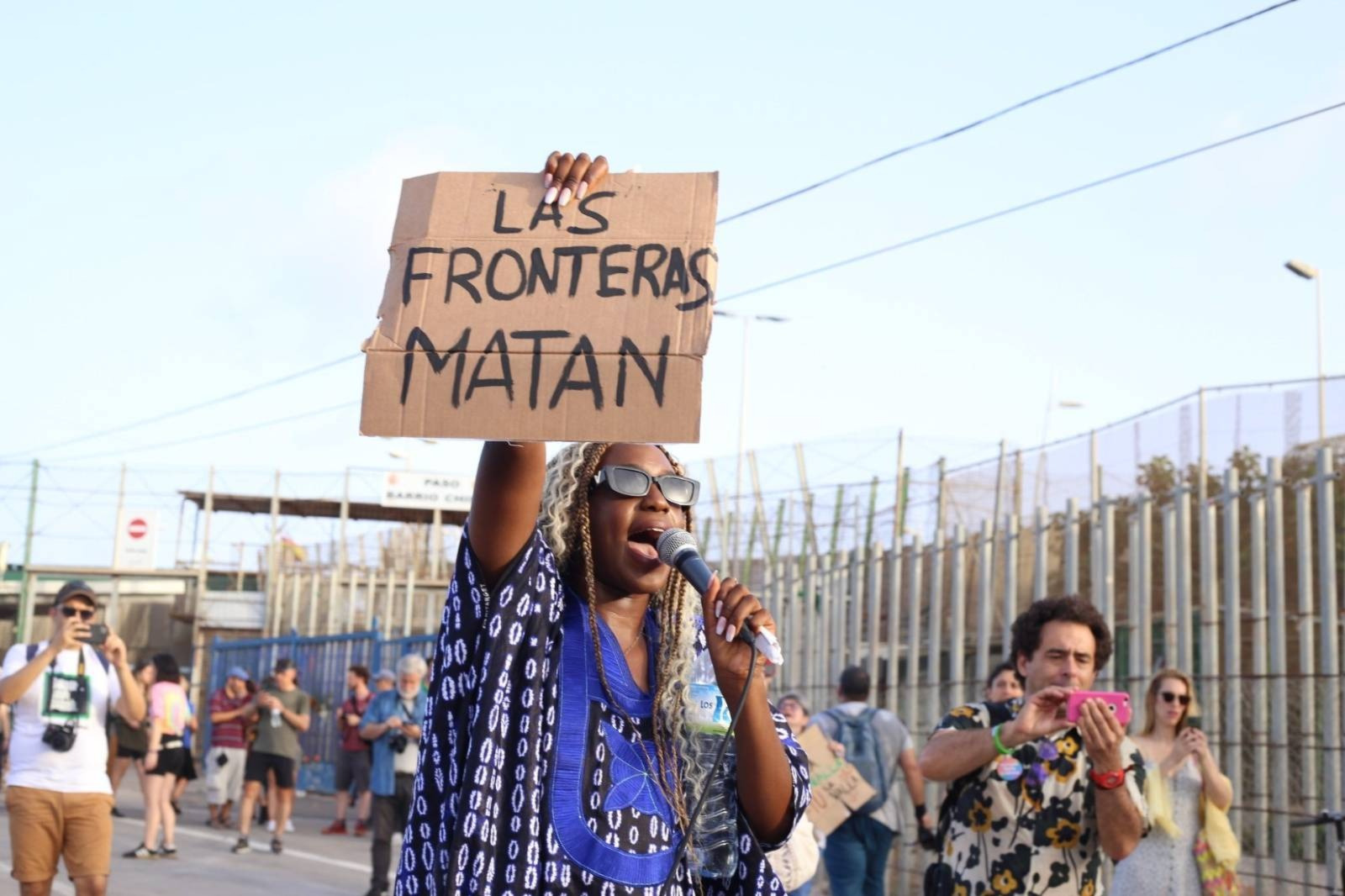
Source: Mathias Rodríguez
Every year, media attention is focused on one massacre or two shipwrecks, but the brutality of Northern states in collaboration with those of the South is constant and daily. Each life counts!
We demand from the European and Spanish authorities:
- Truth, justice and reparations for the victims of the Melilla massacre of 24 June 2022, for those of the Tarajal massacre of 06 February 2014, and for all the innumerable shipwrecks and people killed and missing on the migratory routes.
- Procedures to identify bodies and to establish what they went through (autopsies, DNA testing, witness statements taken into account, video footage…).
We will not cease to call for and support actions that fight for freedom of movement for every human being in the world. A freedom of movement that can only exist in a world free of racism and discrimination. For freedom of movement for everyone.
From Melilla to Tanger, families, loved ones and activists organised CommerorActions to honour those who took action at the gates of Melilla on 24 June 2022 for their right to move. This report bears witness to these actions and the force of the condemnation of these events by our movements.
Melilla
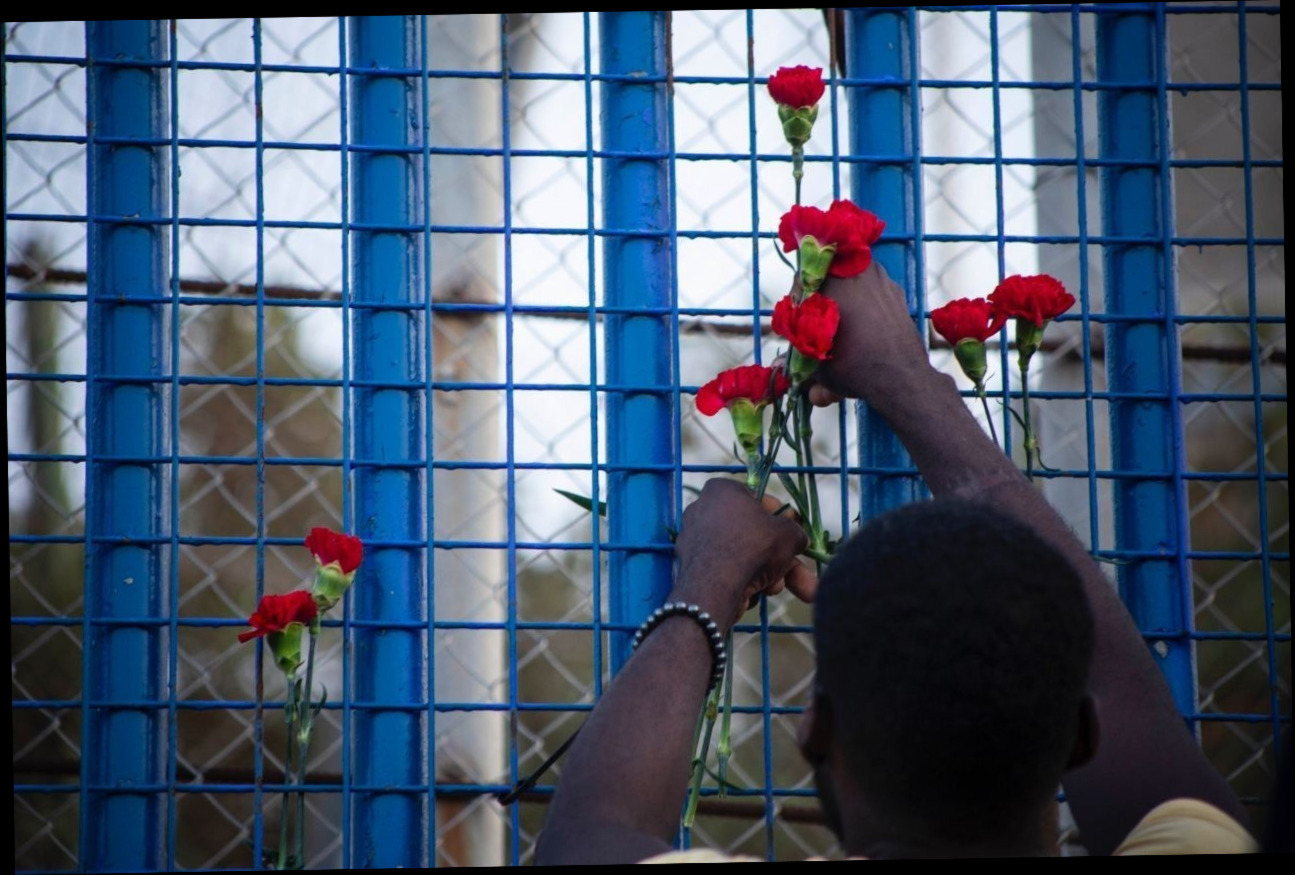
Source: Mathias Rodríguez
“The terrible massacre of 24 June 2022 was commemorated this 24 June. Civil society organisations from different Spanish regions, from Italy and other border zones made the trip to Melilla to remember the victims and their families; to remember the dead whose names we know and those who remain unknown. They came to remember the survivors, to listen to the testimonies from the other side of the fences. But equally to decry the fact that until today no serious, thorough and appropriate investigation has been undertaken to shed light on the massacre of 24 June 2022 at Melilla, one of the gravest violation of human rights carried out at the North African border. We demand justice, truth and reparations and to stop these murders. A new year has passed, we will not forget.” — — J. Activist in Melilla
First march for justice in Melilla on 24 June
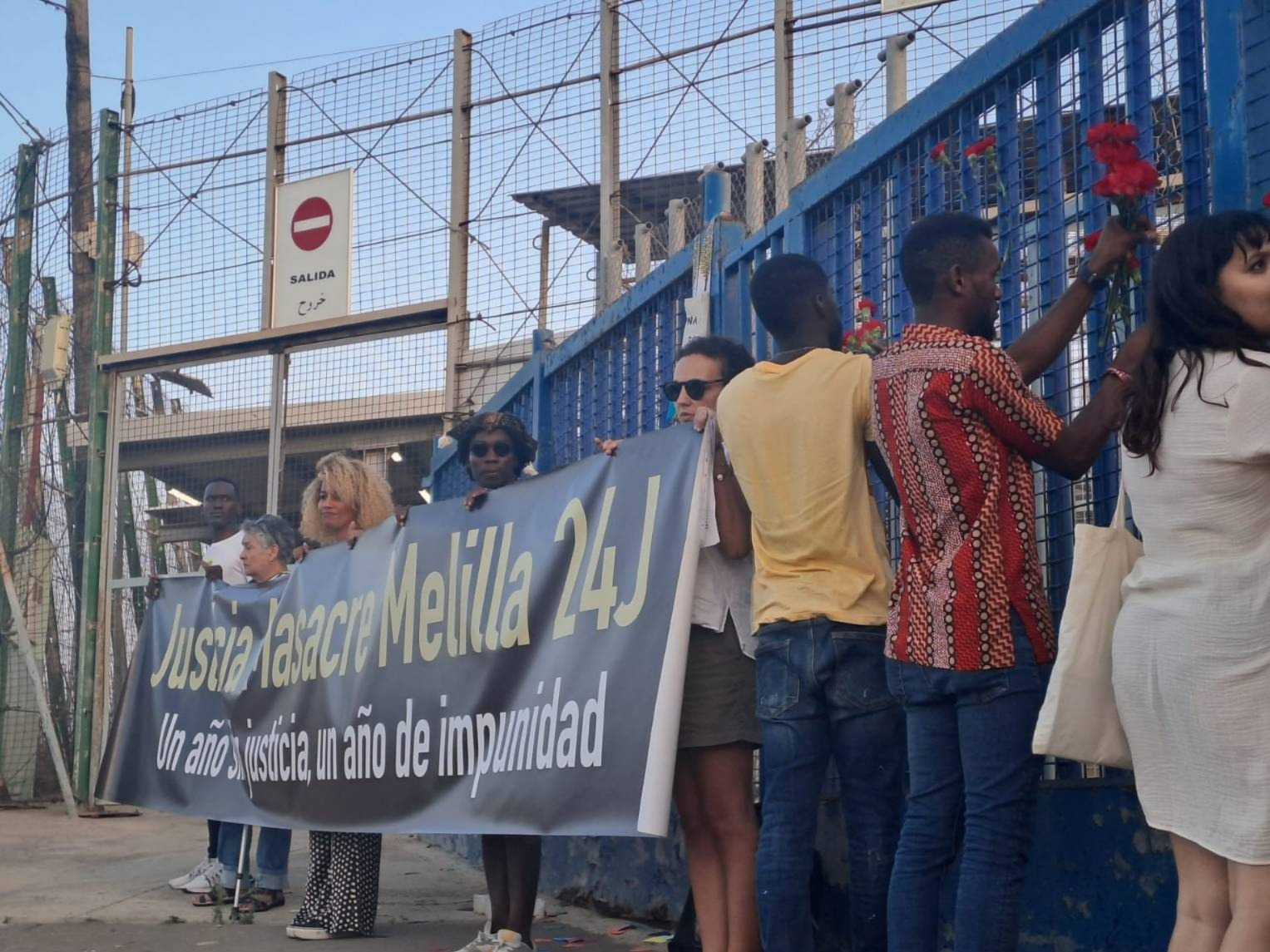
Source: Mathias Rodríguez
“To commemorate the first anniversary of the massacre of 24 June 2022, Melilla was the meeting point for many anti-racist groups who came together from the Spanish state and other parts of Fortress Europe. The aim of this first march for justice was to honour the victims and their families and to demand justice; one year on, the perpetrators of the massacre still enjoy a climate of impunity.
During the weekend of 24 and 25 June, Melilla hosted Caravana Abriendo Fronteras, a Spanish network, joined by the Italian collective Carovane Migranti. This established relations of solidarity between witnesses of violence at the border.
On 24 June the day started with a round table during which members of the Spanish anti-racist movement drew attention to the fact that the Melilla massacre is yet another manifestation of state racism in Spain. In the afternoon, a march for justice took place. About 100 people marched through the streets of the town to the site where the massacre took place a year before. There, as the names of the 114 people killed or missing were read out, carnation blossoms were placed on the border fence.
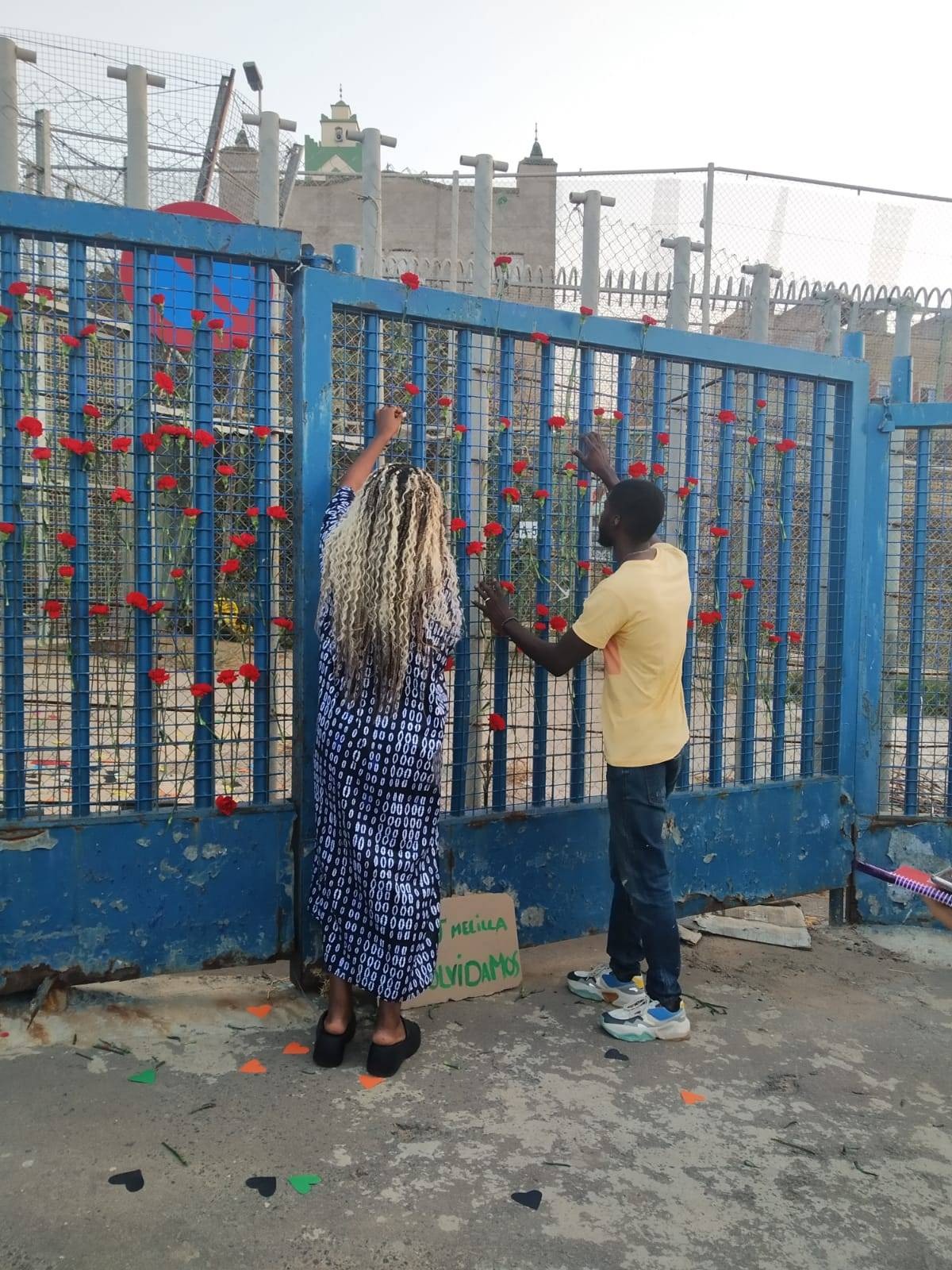
Source: Mathias Rodríguez
The events of the CommerorAction continued the following day with a round table discussion about missing people. It brought together Maria Herrera Magdalena, president of the National Links network, a network made up of 160 collectives of the friends and families of missing people in Central America, and Zahra Barati, sister of Sajad Barati, who recently went missing in a shipwreck which took place in Italian waters off the cost of Cutro in February 2023. Both of them were joined by Carovane Migranti. Finally, in the afternoon, a “circle of silence” was held in the centre of Melilla where those killed and missing on 24 June were remembered once again.” — — A., Alarm Phone Catalonia
Tanger
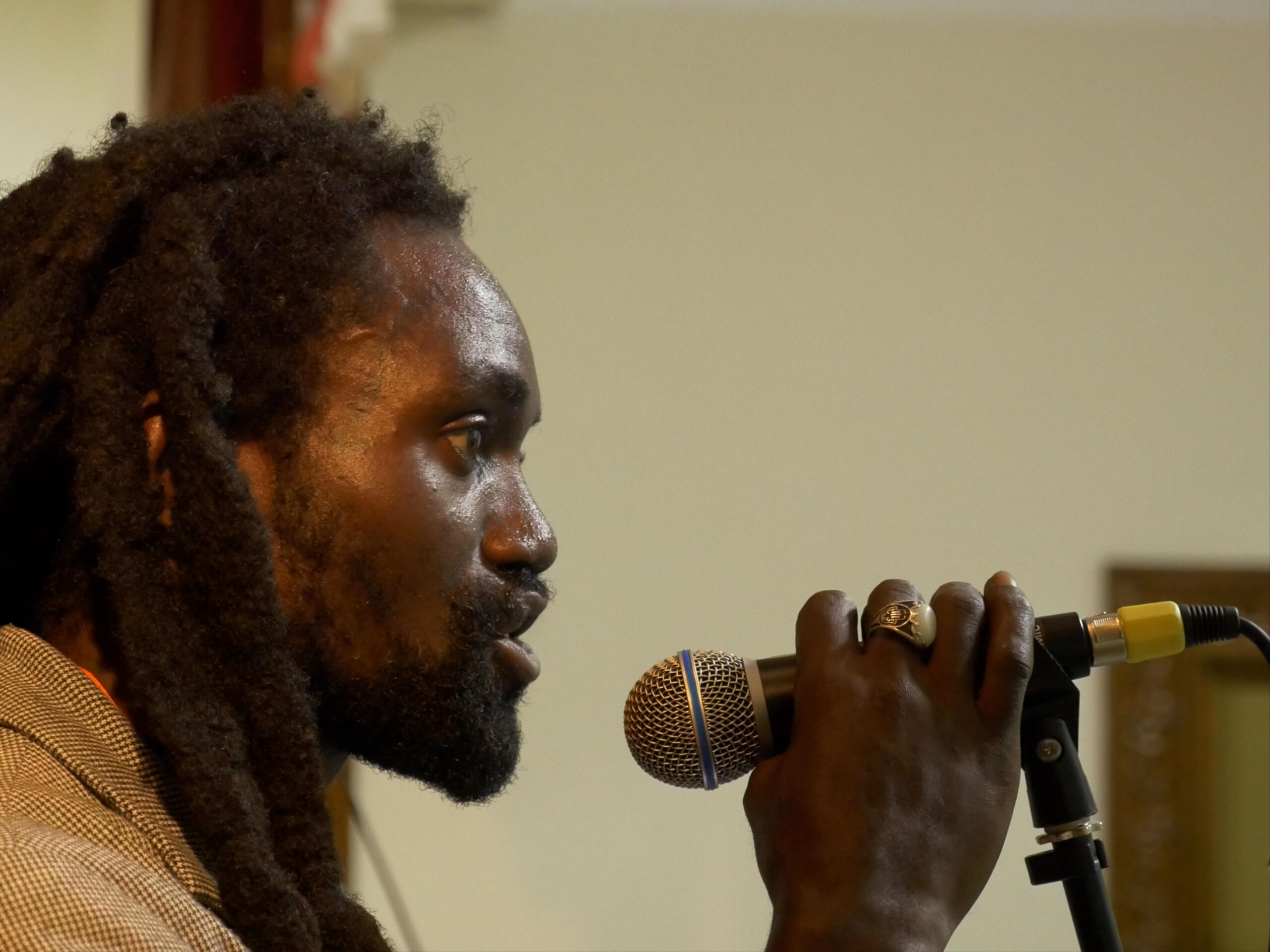
Source: Amélie Janda
In the face of all injustice.
Let there already be a day of injustice.
Of sorrow, of pain.
I’ve been turned into a human monster with a stone for a heart.
I remember my past.
The triangular trade that turned my grandparents from passive captives into proud slaves.
It’s a mess like the circumflex.
In a press in distress.
Stress.
And yet I have seen brothers and sisters hustling, sometimes begging for scraps.
And yet I have seen brothers and sisters, dying in hospitals left to their own devices.
And yet I have seen brothers and sisters, humiliated, insulted, spat at, sometimes disappointed in the face.
And who is to blame?
If everything happens in the space and distance of travel.
Voting is like ears. Hearing, the voice of the immigrant who has spoken.
My name is Aliyah, an emigrant according to the names by which I was called and nicknamed.Slam poem by Jonas
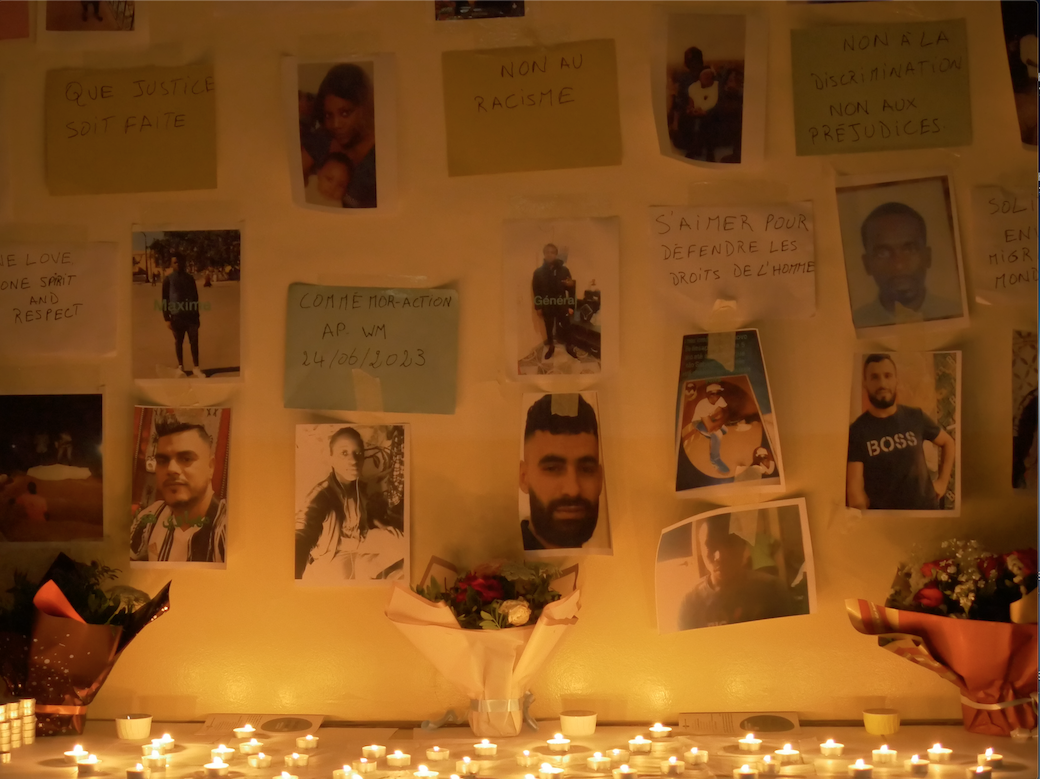
Source: Alarm Phone
“24 June is the date of the massacre which happened last year in Melilla. It was such an awful massacre that it’s almost impossible to believe it really happened. We lost a lot of people, people from Sudan, from Chad and it was a terrible moment. There were people who went missing, people who were hit, beaten to death, people who were stoned to death. We’re still going through the same struggles, and it will never be over.
On the Saturday lots of people came. Normally, our practice is to the memorials outside. Ok, we looked at the situation, we had to do it in a hall.
By the situation, I mean that the city wouldn’t allow us to do it in the street. It is not easy to gather in the port. Perhaps we could’ve done it, but we would have been risking things with the authorities, hence the plan of holding it in the hall. For me, that’s a first. We were in a hall, performers came as well as the people who joined us, lots of people.” — — R., Alarm Phone Nador
At the Tanger CommermorAction a number of performers went on stage to pay their respects to the people killed and missing.
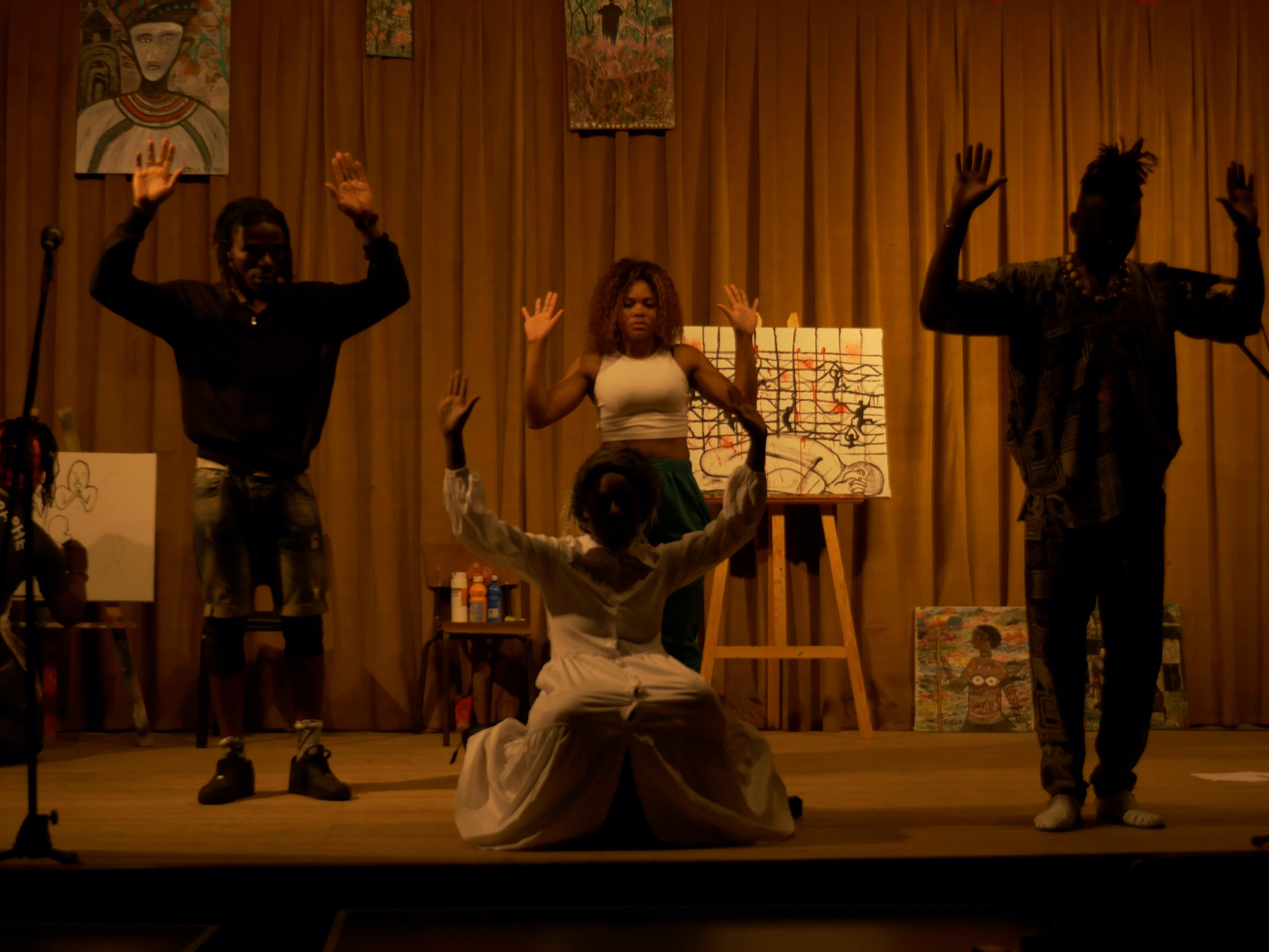
Source: Alarm Phone
“There were several moments that particularly struck home for me yesterday. It was meditative, all those photos on the wall. I tell you, it could have been me, it could have been my brother, it could have been my sister. I saw how moved people were in front of those photos. That struck me really hard as did the fact of being on the stage. It’s a longtime since I’ve been on a stage, because I had a few pregnancies, one after the other. And, in fact, it’s just three months since I had a baby. So I hadn’t really started physical activity again. And to see myself on the stage like that, with all that energy, that struck me as well.” — — A., Alarm Phone Rabat
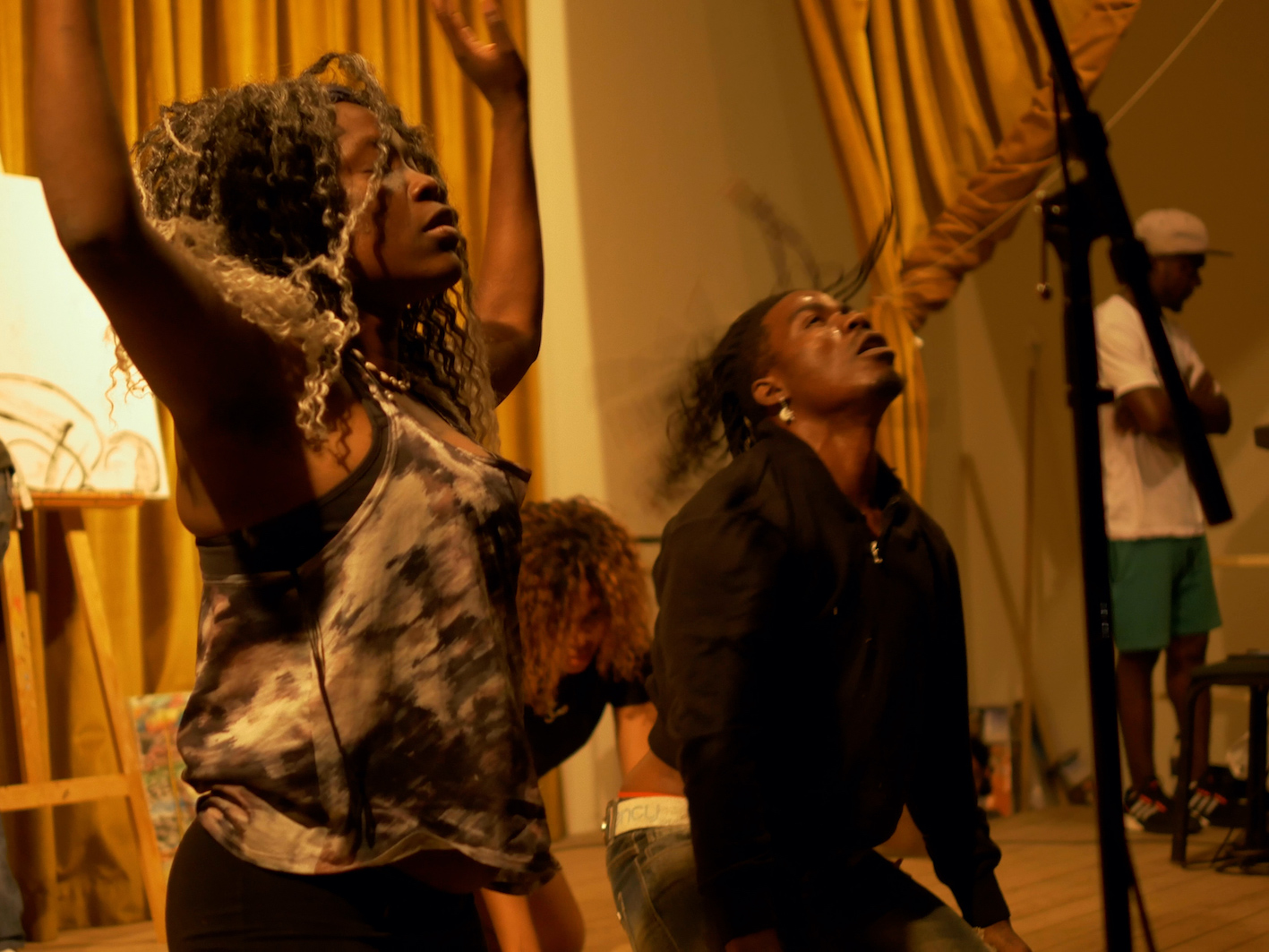
Source: Amélie Janda
“I am standing here with a broken heart. Even to call it a commemoration upsets me. To my ears, it sounds bad. Because to commemorate is to deny that these deaths and disappearances are still happening, that they happen each time a tragedy occurs. These are deaths that are happening in ways that we cannot even hear. These are deaths that happen in a way that we cannot even imagine. So we have to carry in our hearts the reason for this commemoration and say to you that we know about these deaths, that they must stop and that we will not forget them. Because to forget about them would be to kill those who died a second time, so that’s why we mark them. So that we do not forgot them. We are fighting so that they will happen no more.” — — K., Alarm Phone Tanger
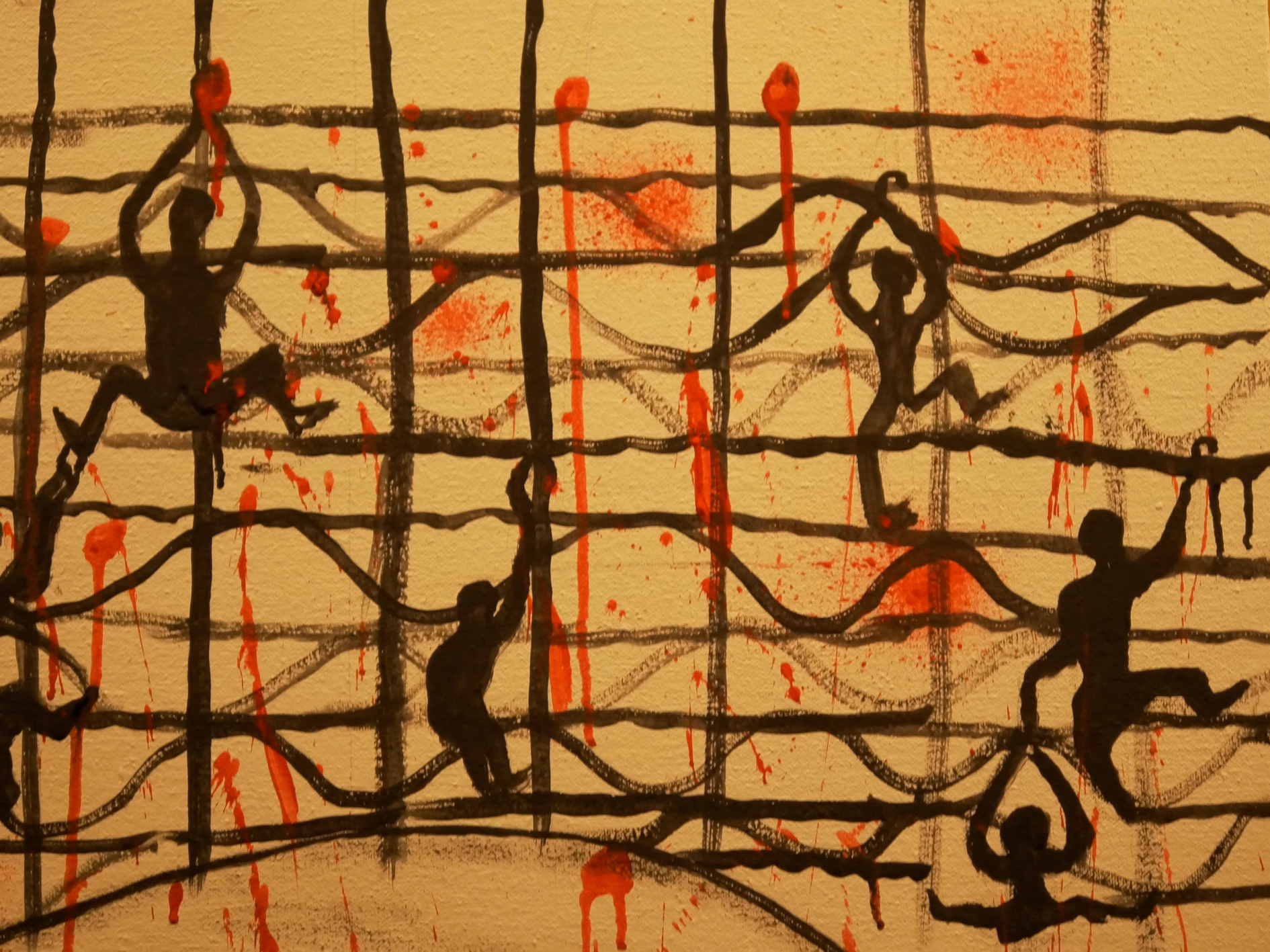
Source: Alarm Phone, artist: Axel Fotsing
Tanger was also first site of CommerorAction for some families.
“It is very important to sanctify these deaths and it brings us comfort as today I truly felt relieved [to know] that the soul of my sister, who died in the desert in 2019, is going to rest because so many people were in tears. So many people shared our pain. I sent videos to our mother in Cameroon. She cried as well, but she liked it. She said, finally, her daughter can rest because, at the very least, people who didn’t know her have mourned for her.”
“I stopped crying today and it is you who have given me this strength because before I couldn’t come to understand how someone can die in the desert, how someone can die. They are buried without their family. I couldn’t come to understand how you can look at someone like a piece of wood. I could not come to understand. But today, this memorial helped me to understand that I am not alone.”
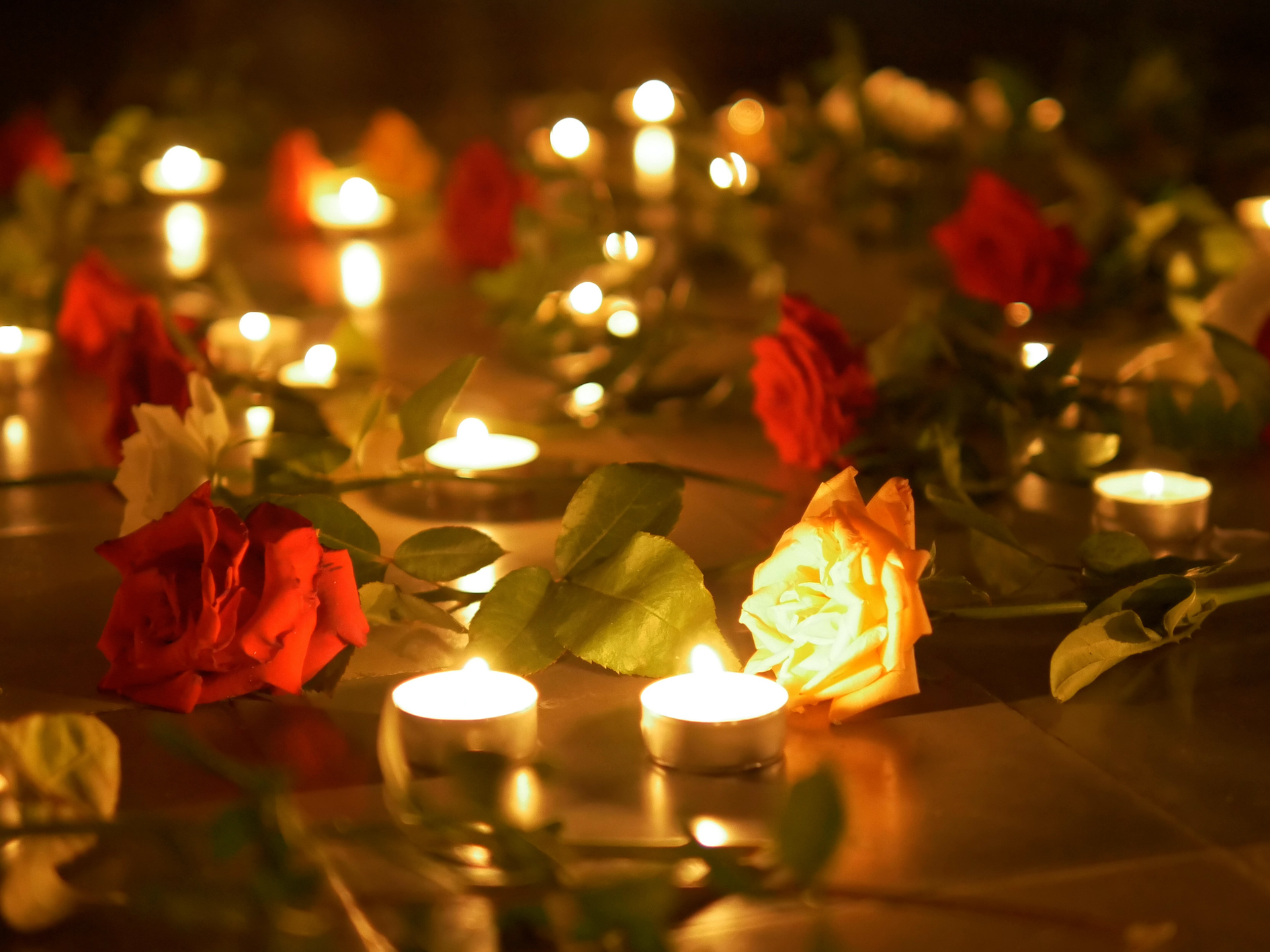
Source: Amélie Janda
A look back at the history and importance of CommemorActions
The CommemorAction of 24 June 2023 was also an opportunity to revisit the importance of these moments of commemoration and political agitation for the families and loved ones of the missing and for our networks.
“For me, it [CommemorAction] is very important. Firstly, it is, one can say, a sort of psycho-social support for the families of the missing, to say to them that this person is not forgotten. We will always be there to fight against everything that has happened. That’s the first thing and it is really important to reassure the brothers and sisters. Because sometimes, and it is something they often say, it is us the families who have lost our brothers, we, the mothers, we don’t know what happened. There is no one on our side. So this commemoration is about thinking about those families. It’s about saying we are with you. That’s the first thing.
Secondly, it is a form of awareness raising because during the commemoration we don’t just invite, for example, civil society, the organisations who work in the field of human rights. We also invite other people who aren’t familiar with the topic to educate them, as well as children. So that we say, look, there is a problem in this area that is only spoken about when there is a commemoration. For example during the 2019 commemoration in Oujda, there were lots of people, from all over, including Mexico and other countries. So there were families who came from other countries to be with the families there in Oujda in order to say that it is not just you who are facing this issue.
It doesn’t matter who, any person has the right to charge their life. Meaning what? That if they want to travel to Europe, Australia or other countries, they have the right to travel without there being this border which is, as they know, like a barrier for them which prevents them from travelling. We want freedom of movement, so the commemoration, it’s beautiful, but it’s also a moment to push forward our political project. We hold it to speak about the families of the missing and their struggle. Why are there families of the missing? Because there are people who want to travel, who just want to be free to move around the world whenever they want. But they are prevented from doing so by this policy of strengthening the border. And there are those in the European Union who give money to Morocco so that they block people on the move. They say to themselves, “me, I’m leaving tomorrow for Morocco to block the migrants over there”. It is a violent policy. It is the reason why there are missing people. This is why there are people who die in the sea, in France and who fall into ditches, for example, between Algeria and Morocco. It is why there are pregnant women who die at the border, like in Melilla. We do this to make people aware and to say that migration is not a crime, it’s a right.” – – I, Alarm Phone Oujda
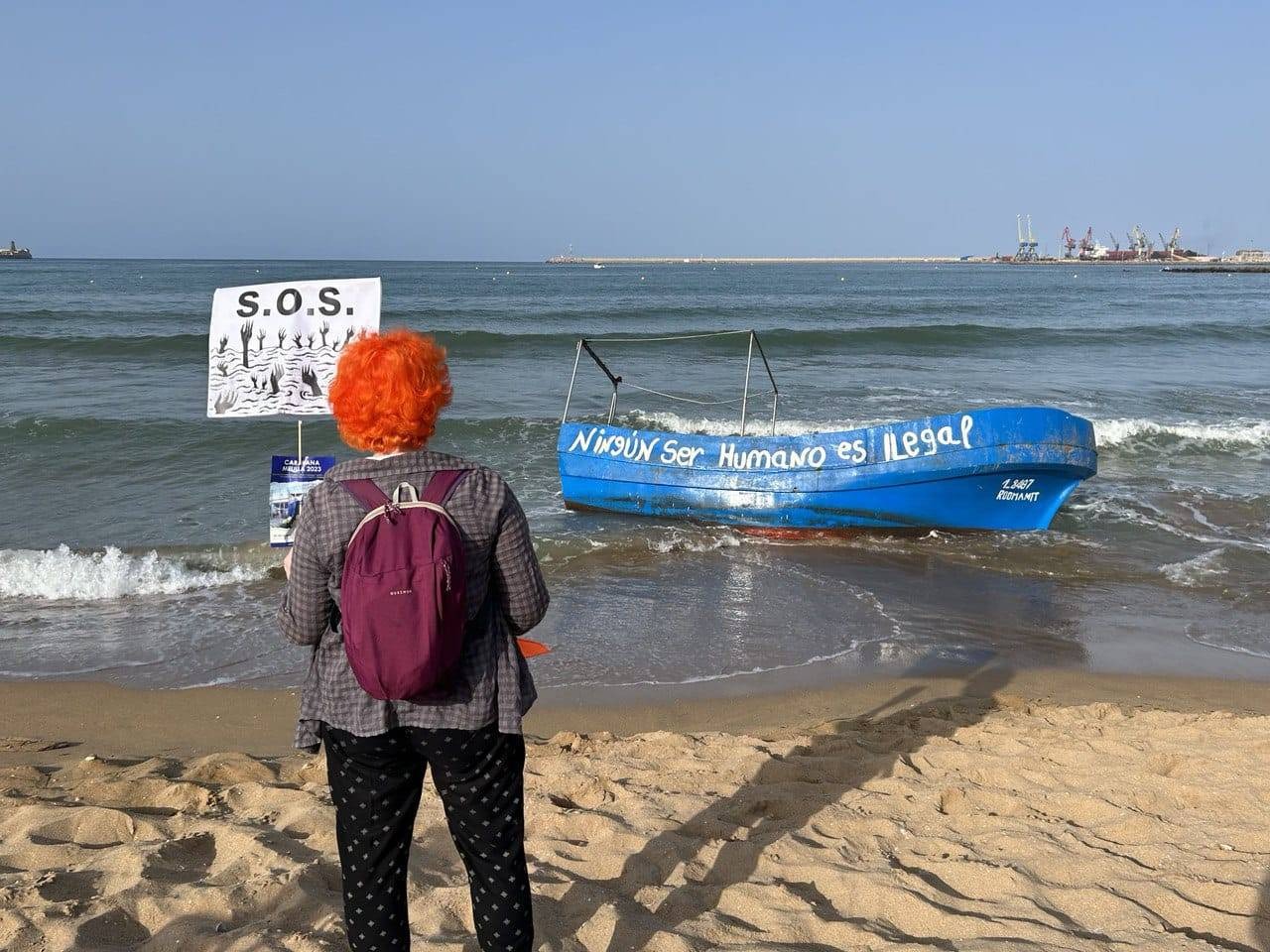
Source: Mathias Rodríguez
“CommemorActions is a project that we started in 2008 in Oujda. In the work that we do helping people in distress in the Mediterranean and on the Atlantic route we are also, and just as much, following up [boats and missing people]. Very often that falls on us, the contact people [for the Alarm Phone], who are on the ground and who can find out what happened. We held discussions within our network about how we could start this project of thinking about the people who don’t have any information about their loved one and who can’t find out anything about them. I think that it was this idea that was the basis for starting this practice of remembrance and action to not forget those who disappear in the sea.
We also saw that it was important that there would be this practice in regards to the families who are looking for their loved ones. Yes, [it’s important to make the connection with the loved ones] because everything has collapsed for those who have lost children or their loved ones. In short, I can put myself in their place. Because when I wanted to cross, I think that my family weren’t even aware of it. I can also imagine, for example, that if I’d lost my life in the Mediterranean, that would have been a doubly hard blow. Because the moment when my parents found out that I had gone there without saying anything was already a problem. And if I had lost my life in that situation as well, what are they going to be able to do? Are they going to get my body back? Can I put myself in these people’s shoes? I think so. These are things that we experience daily, because we’ve had friends whom we met here and who lived through the nightmare with us. At some point a family is created. And some lose their lives.
Commemoration, it’s something that must be done in a public place. Everyone is affected by the situation. There is no one who doesn’t know someone who died at sea. It is something that touches all of us, we’ve all been in the same situation, we’ve had friends, we’ve had brothers, we’ve known people who lost their life in a border zone. So, if we hold these events in public places, that’s the point. It’s so that everyone can come along.” – – S., Alarm Phone Dakar
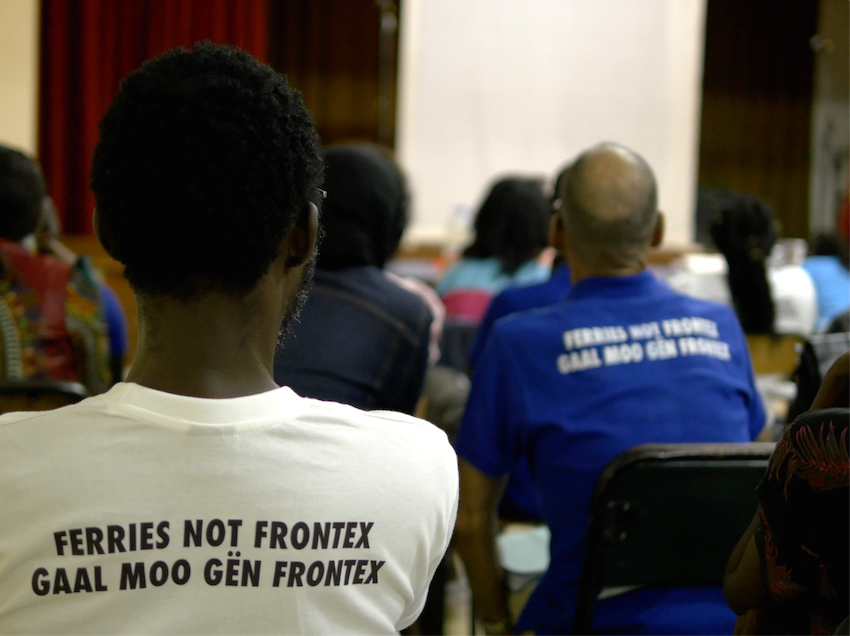
Source: Alarm Phone
“CommemorActions are important. It’s important for everyone to be able to know what’s going on, that there’s commitment in the field. We need to hold commemorations to support the families, to show to the families and other people around the world that we do not forget the people who have disappeared.” – – R, Alarm Phone Nador
“For me a commemoration, it’s already a way of remembering these people. So that they don’t die in anonymity, because most of the time, aside from their families, no body remembers them. We’re going to give misleading numbers of deaths. They are just numbers for some people. But I would really like it if we remembered them as human beings.
I had two friends, girls, who were hairdressers. They were friends of mine and they were much younger than me. The youngest, she wasn’t even 20. They were Congolese from the DRC, they wanted to cross to the other side with their brothers who they had come with. And, at a certain moment, they were afraid because the youngest had a dream. She is in her dream. She sees herself dying in the water. Straight away, she says to her sister that they’re not going any more. They are going to stay, they will get along just as well here. They hid themselves.
Source: Alarm Phone. Artist: Axel Fotsing
Their big brother hunted for them for 10 days. He found them and he put them in a boat in Nador, both of them, by force. He put them in a boat in Nador and he left for Tangier. It would have been safer had there been money for all three of them to be able to leave from Tanger. But he sent them via Nador and he himself left via Tanger and he made it. They never arrived. Their bodies have never been found and when I heard the news, I still had the hair that they had done for me on my head. Maybe I have never come to terms with it. The bodies were never found. It’s like that.
And for me, CommemorAction, is a way of remembering all this, of giving it a face, that these people had lives as well. They had friends who cared about them. And to remind the world about what is happening, that there are people who die on these routes.
According to me, CommemorActions are not simply actions. It is why we say ‘CommemorAction’, because we commemorate but they are also actions. We don’t have weapons to be able to fight against this politics, but we make do with our words. We are going to use these commemorative actions to speak out against what’s happening and to say that these people are human. They are human beings. It is not figures or ideas or pieces of word that die in the Mediterranean, it is a part of humanity. They should be ashamed. You should not be proud of the death of part of humanity. You should be ashamed of it.” – – A., Alarm Phone Rabat
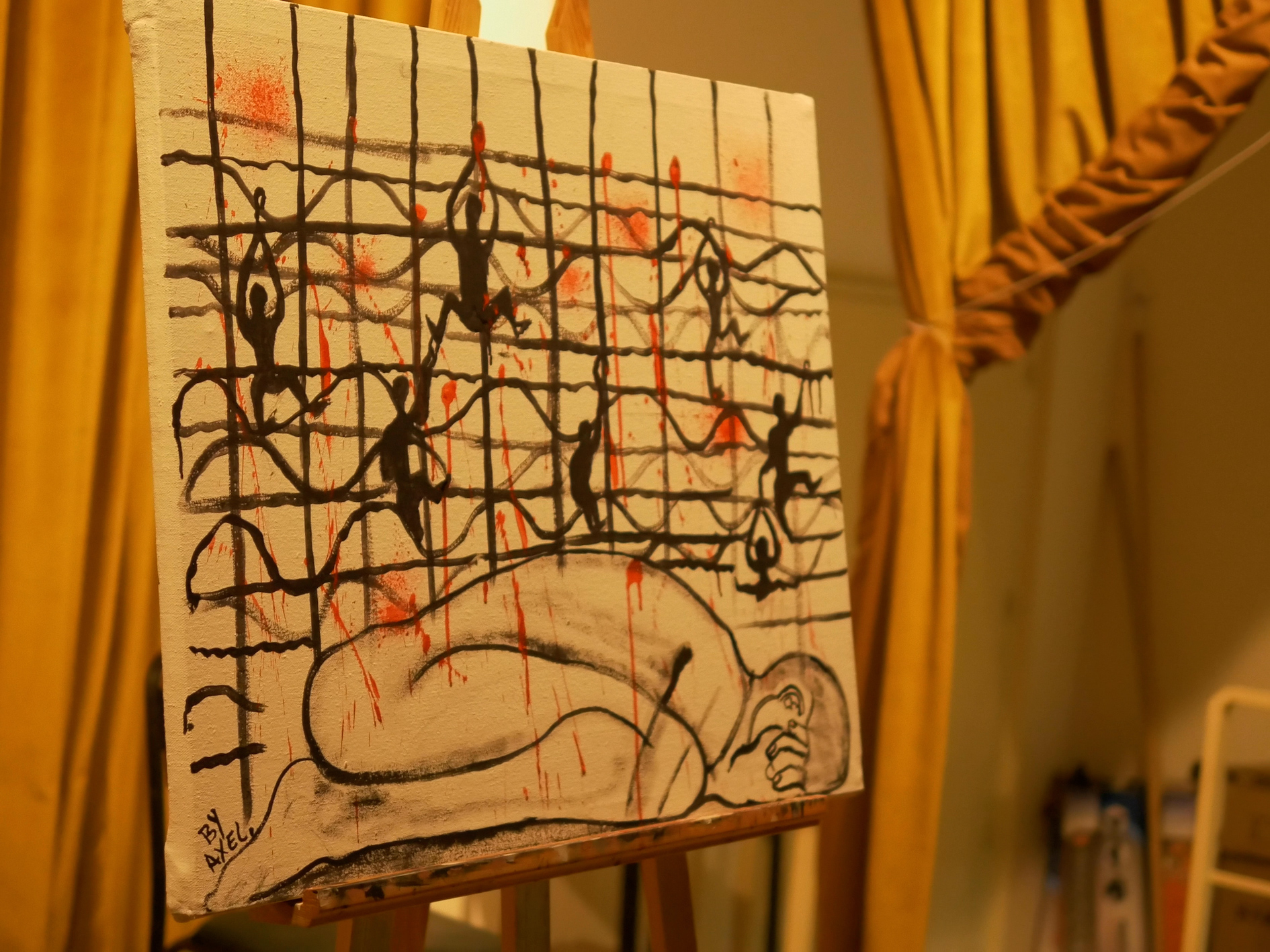
Source: Alarm Phone, artist: Axel Fotsing
The Scarlet Dawn, dressed in her stained gown, makes her mournful parade.
Eyes in flood have vomited.
Too much sadness.
Humanity has unraveled.
In the cupboard of my memory, this infamy screams.
It is infamous.
Pleadings of hatred, injustice.
And shame.
In the cupboard of the memory of mankind bodies are jostling in perdition, souls wandering.
Because of an unhealthy tradition, we keep our humanity to ourselves.
They are on the wrong side of the gate.
The foam of the waves makes hearts cry.
I’d like to temper mine between the devil and the deep blue sea.
Beyond the numbers, there are worlds that are disappearing, worlds that are evaporating.
While the lords of this world embrace each other in the hope of suffocating the hope that eats itself with every shipwreck.
Millennia of regression.
Who will foot the bill?
Whole swathes of our history wiped out.
While the well-off choose to look the other way, who will foot the bill?
Beyond the puppet show of numbers there is the shadow of a mother in the lair of the sea, the ghost of a son haunting the stone walls.
An obsolete prayer that hasn’t broken hearts.
On a lost post.
Somewhere between two camps, drops of blood persist.
Not very anonymous.
From a husband who will never again kiss his beloved, a piece of stateless soul.
Floating on the waters.
The gasps of a sister clinging to a fence.
On the other side of the sea, a mother waits.
A mother waits for the time for a tear,
for the time of a smile, that will resurrect her womb.
A father hopes.
Beyond your puppet show of numbers, there are lives.
There is a mother, a sister, a father, a son, a brother, a friend.
Beyond the numbers.Slam poem by Aurore
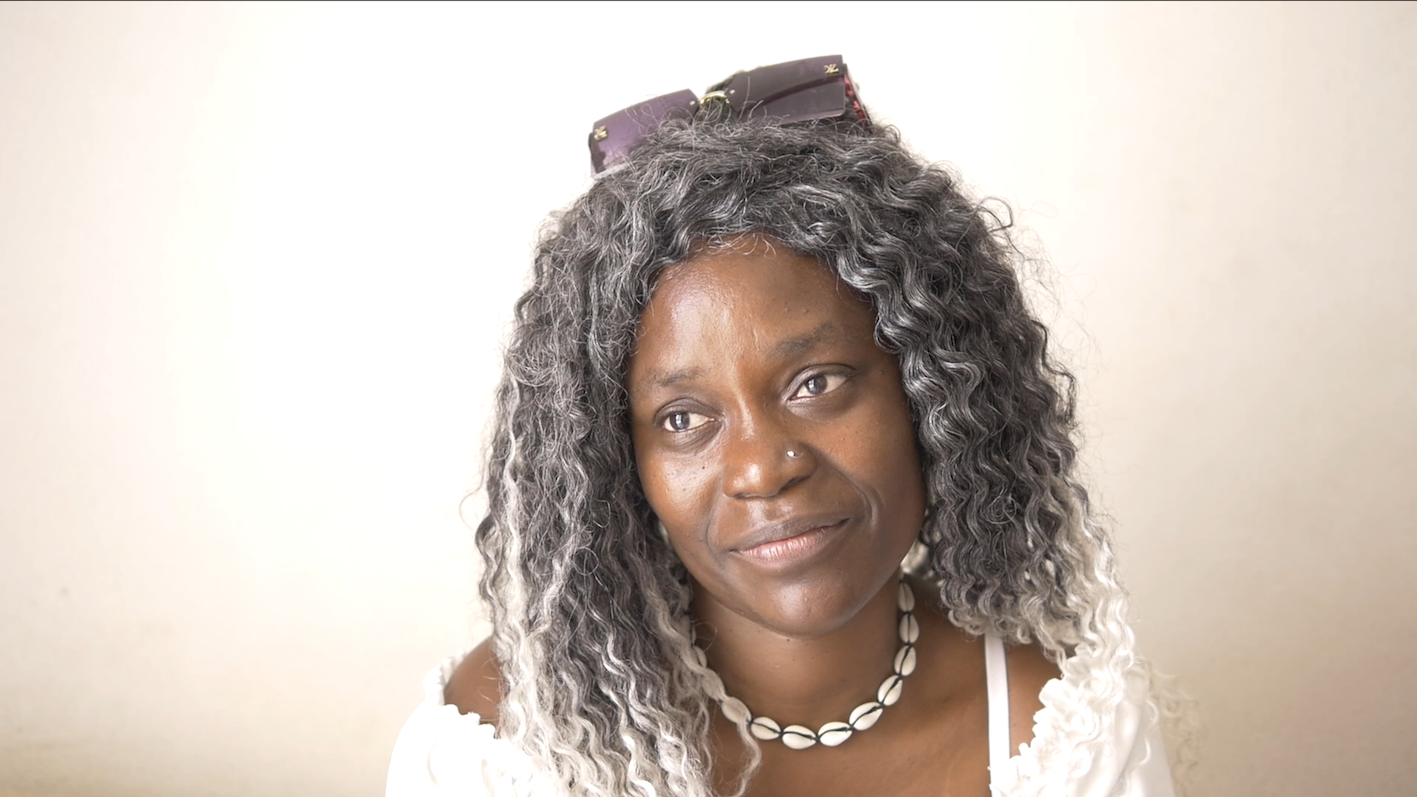
Source: Amélie Janda
“As long as there are not open borders, there will be people who disappear. So we have to stop that. Thus the fight is to see freedom of movement, to see how we can regulate, relax or even leave the borders open; all the air borders, because sub-Saharan migrants have problems getting visas. That’s why they take to the road.
Do I think about stopping this struggle? No. When I think about the people who need it, who need you, I don’t think that I’ll ever stop. As long as they’ve closed their borders, we are going to carry on the fight for them to be open.” – A., Alarm Phone Rabat
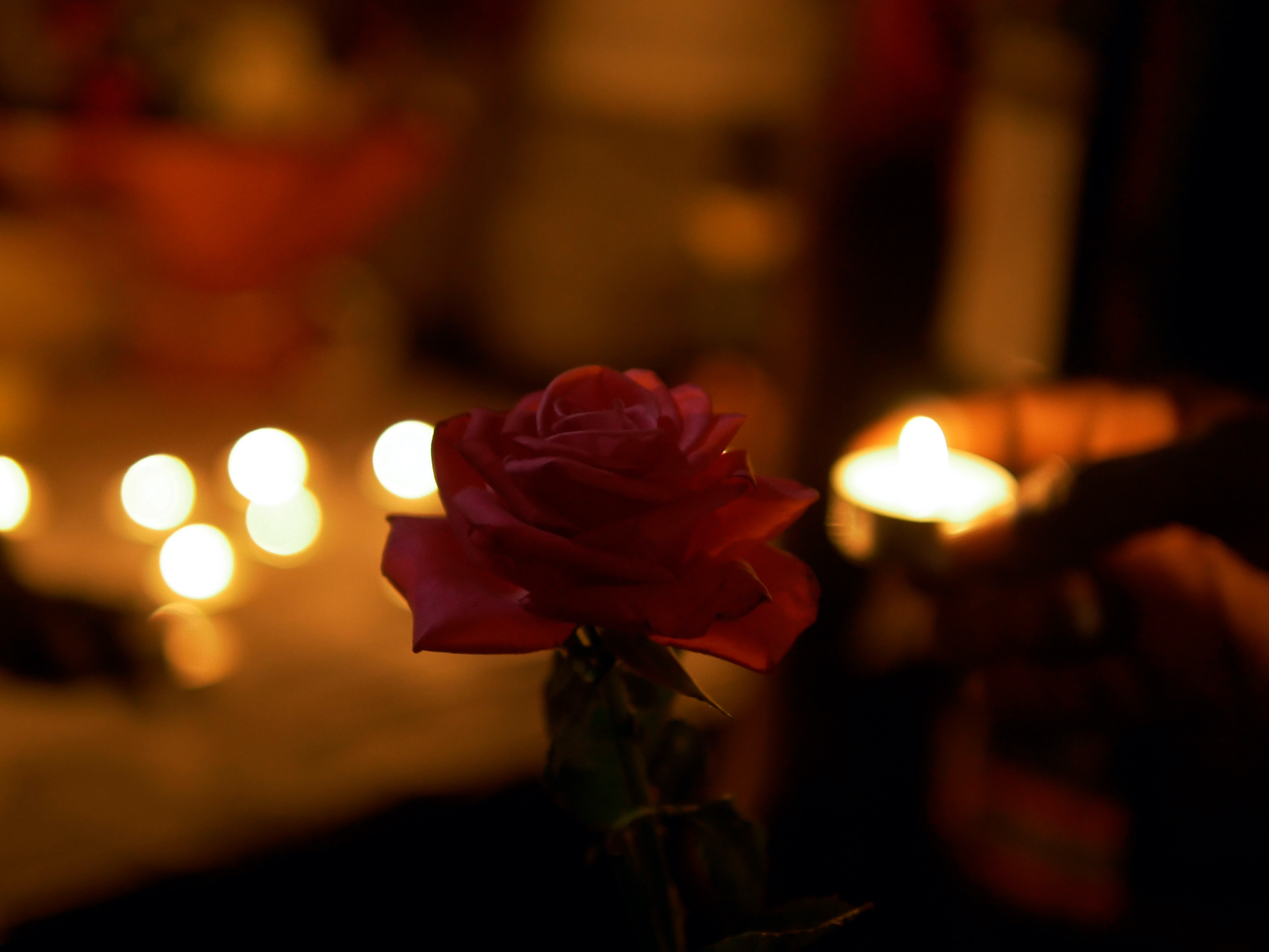
Source: Amélie Janda
